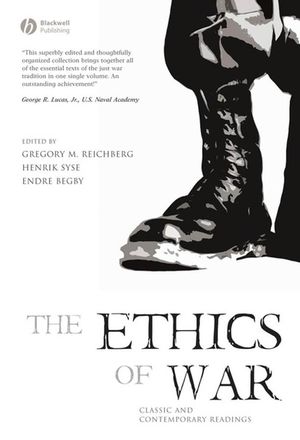The Ethics of War: Classic and Contemporary ReadingsISBN: 978-1-4051-2377-8
Hardcover
760 pages
July 2006, Wiley-Blackwell
 This is a Print-on-Demand title. It will be printed specifically to fill your order. Please allow an additional 10-15 days delivery time. The book is not returnable.
Other Available Formats: Paperback
|
||||||
Acknowledgments.
Part I: Ancient and Early Christian.
1. Thucydides (ca. 460–ca. 400 BC): War and Power.
2. Plato (427–347 BC): Tempering War among the Greeks.
3. Aristotle (384–322 BC): Courage, Slavery, and Citizen Soldiers.
4. Roman Law of War and Peace (7th century BC–1st century AD): Ius Fetiale.
5. Cicero (106–43 BC): Civic Virtue as the Foundation of Peace.
6. Early Church Fathers (2nd–4th century): Pacifism and Defense of the Innocent.
7. Augustine (354–430): Just War in the Service of Peace.
Part II: Medieval.
8. Medieval Peace Movements (975–1123): Religious Limitations on Warfare.
9. The Crusades (11th–13th century): Christian Holy War.
10. Gratian and the Decretists (12th century): War and Coercion in the Decretum.
11. John of Salisbury (ca. 1120–1180): The Challenge of Tyranny.
12. Raymond of Peñafort (ca. 1175–1275) & William of Rennes (13th century):.
The Conditions of Just War, Self-Defense and their Legal Consequences under Penitential Jurisdiction.
13. Innocent IV (ca. 1180–1254): The Kinds of Violence and the Limits of Holy War.
14. Alexander of Hales (ca. 1185–1245): Virtuous Dispositions in Warfare.
15. Hostiensis (ca. 1200–1271): A Topology of Internal and External War.
16. Thomas Aquinas (ca. 1225–1274): Just War and Sins against Peace.
17. Dante Alighieri: (1265–1321): Peace by Universal Monarchy.
18. Bartolus of Saxoferrato (ca. 1313–1357): Roman War in Christendom.
19. Christine de Pizan (ca. 1364–ca. 1431): War and Chivalry.
20. Raphaël Fulgosius (1367–1427): Just War Reduced to Public War.
Part III: Late Scholastic and Reformation.
21. Erasmus of Rotterdam (1466–1536): The Spurious ‘Right to War’.
22. Cajetan (1468-1534): War and Vindicative Justice.
23. Niccolò Machiavelli (1469–1527): War Is Just to Whom It Is Necessary.
24. Thomas More (ca. 1478-1535): Warfare in Utopia.
25. Martin Luther (1483-1546) and Jean Calvin (1509-1564): Legitimate War in Reformed Christianity.
26. The Radical Reformation: Religious Rationales for Violence and Pacifism (16th Century).
27. Francisco de Vitoria: (ca. 1492–1546): Just War in the Age of Discovery.
28. Luis de Molina (1535–1600): Distinguishing War from Punishment.
29. Francisco Suárez (1548–1617): Justice, Charity, and War.
30. Alberico Gentili (1552–1608): The Advantages of Preventive War.
31. Johannes Althusius (1557–1638): Defending the Commonwealth.
32. Hugo Grotius (1583–1645): The Theory of Just War Systematized.
Part IV: Modern.
33. Thomas Hobbes (1588–1679): Solving the Problem of Civil War.
34. Baruch Spinoza (1632–1677): The Virtue of Peace.
35. Samuel von Pufendorf (1632–1694): War in an Emerging System of States.
36. John Locke (1632–1704): The Rights of Man and the Limits of Just Warfare.
37. Christian von Wolff (1679–1754): Bilateral Rights of War.
38. Montesquieu (1689–1755): National Self-Preservation and the Balance of.
Power.
39. Jean-Jacques Rousseau (1712–1778): Supranational Government and Peace.
40. Emer de Vattel (1714–1767): War in Due Form.
41. Immanuel Kant: (1724–1804): Cosmopolitan Rights, Human Progress, and Perpetual Peace.
42. G.W.F. Hegel (1770–1831): War and the Spirit of the Nation-State.
43. Carl von Clausewitz (1780–1831): Ethics and Military Strategy.
44. Daniel Webster (1782–1852): The Caroline Incident (1837).
45. Francis Lieber (1800–1872): Devising a Military Code of Conduct.
46. John Stuart Mill (1806–1873): Foreign Intervention and National Autonomy.
47. Karl Marx (1818–1883) & Friedrich Engels (1820–1895): War as an.
Instrument of Emancipation.
Part V: 20th Century.
48. Woodrow Wilson (1856–1924): The Dream of a League of Nations.
49. Bertrand Russell (1872–1970): Pacifism and Modern War.
50. Hans Kelsen (1881–1973): Bellum Iustum in International Law.
51. Paul Ramsey (1913–1988): Nuclear Weapons and Legitimate Defense.
52. G.E.M. Anscombe (1919–2001): The Moral Recklessness of Pacifism.
53. John Rawls (1921–2002): The Moral Duties of Statesmen.
54. Michael Walzer (b. 1935): Terrorism and Ethics.
55. Thomas Nagel (b. 1937): The Logic of Hostility.
56. James Turner Johnson (b. 1938): Contemporary Just War.
57. National Conference of Catholic Bishops (1983 & 1993): A Presumption against War.
58. Kofi Annan (b. 1938): Toward a New Definition of Sovereignty.
Index



